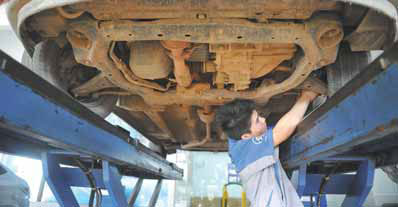Survey: Rising domestic car quality
Owners report fewer problems, gap with foreign brands closing
Domestic automakers continue to make strides in improved vehicle quality as they narrow the gap with international brands, JD Power & Associates Asia Pacific found in its latest survey of new car owners in China.
The study said the performance of domestic brands helped drive the industry-wide average for reported problems to a record low.
Now in its 14th year, the study examines problems experienced by new-vehicle owners in the first two to six months of ownership in two categories: design-related problems and defects and malfunctions.
The overall initial quality score is determined by problems reported per 100 vehicles.
Overall initial quality of domestic brands improved to a rate of 155 in this year's survey, a significant drop from an average of 212 problems per 100 vehicles in 2012. The quality of international brands also improved, falling to 104 in 2013 from 117 last year.
The gap in quality scores between domestic and international brands narrowed to 51 in 2013 from 95 in 2012.
"We see significant improvement in domestic brands in their initial quality," said Jacob George, vice-president and general manager of JD Power Asia Pacific. "And if they maintain such improvement, domestic brands may catch up to their international rivals in terms of initial quality in 2018."
"Until then, the overall vehicle initial quality in China will be similar to that in the US market," he added.
The improvement of Chinese brands is driven by a significant reduction in the number of problems related to the engine and transmission, and the heating, ventilation and air conditioning systems, each decreasing by 12 reported problems per 100 vehicles, according to the study.
"It is the result of Chinese domestic brands' heavy efforts in 4P - process, people, parts and product design. And they should further focus on these sectors to continue the improvement of initial quality," said George.
Lexus and Mercedes-Benz tied for the top rank in the study, averaging 52 reported problems for each 100 of their cars sold. Subaru ranked third followed by Volkswagen and BMW.
Big step
Mei Songlin, vice-president and managing director of JD Power China Operations, said "domestic brands achieved tremendous improvement in vehicle quality in 2013, with four domestic brands - Trumpchi, Venucia, Roewe and Luxgen - performing above the industry average".
"It's a big step in a year as no domestic brand exceeded the industry average in our study in 2012," he said, noting "we have seen the gap with international brands continually narrow during the past 14 years from 396 in 2000 to 51 in 2013".
Overall initial quality across the industry averaged 119 this year, the lowest rate since the inception of the study in 2000.
When viewed by country of manufacturer origin, South Korean brands had the highest overall initial quality with an average of 85, an improvement of 8 from 2012, followed by Japanese brands at 104, improving by 9 from 2012. European and US brands both averaged 108 with 11 and 28 fewer problems respectively.
Maintaining high initial quality is crucial as it is the most important driver of purchase decisions by new-vehicle buyers, said a JD Power's sales satisfaction study.
The 2013 China Initial Quality Study found that among owners who experienced no problems with their vehicle, 36 percent say they "definitely will" recommend their brand to others, while 18 percent say they "definitely will" repurchase the brand. In contrast, among owners who experience more than one problem with their vehicle, the rates of those who say they will recommend and repurchase decline to 25 percent and 12 percent respectively.
Major concerns
"To further improve initial quality, automakers should focus on the most frequently reported problems among Chinese vehicle owners such as issues regarding fuel efficiency and various noise problems," said Tony Zhou, automotive research director at JD Power China.
Excessive fuel consumption has remained the most frequently reported problem since 2007. New-vehicle owners in China tend to be particularly sensitive to noise problems; with brake noise and excessive wind noise the second and third-most frequently reported problems. Abnormal noises from the engine and tires are also among the most frequent complaints.
Statistics from China Association of Automobile Manufacturers show that in the first nine months, combined vehicle sales by domestic brands increased 12.14 percent to 5.13 million units, accounting for 39.89 percent of the overall market, a drop in share of 0.67 percentage points from last year.
Surviving the fierce competition, especially after the international automakers entered the lower-end segments, domestic automakers should continue to invest heavily to improve the product quality, said analysts.
JD Power's initial quality study was based on evaluations from 21,181 owners of new vehicles purchased in China between October 2012 and June 2013.
|
A technician checks a car at a Hyundai dealer in Haikou, Hainan province. When viewed by country of manufacturer origin, South Korean brands had the highest overall initial quality. Meng Zhongde / for China Daily |

























